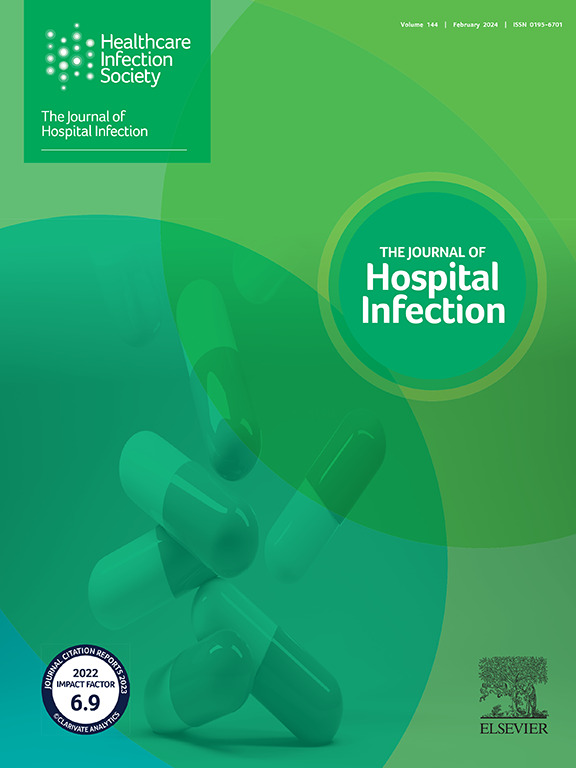加拿大阿尔伯塔省感染预防和控制的研究重点:改进的德尔菲过程。
IF 3.1
3区 医学
Q1 INFECTIOUS DISEASES
引用次数: 0
摘要
目的:通过共识确定存在感染预防和控制(IPC)证据差距的特定研究问题。设计:采用改进的德尔菲法和共识会议。背景:艾伯塔省保健服务/盟约保健为加拿大艾伯塔省450万人提供保健服务。参与者:感染控制专业人员;IPC领导力;IPC、传染病和微生物学方面的医生;流行病学家;分析师;政府官员;质量和安全以及抗菌素管理代表;研究人员;病人/家庭顾问。方法:多学科委员会通报共识过程。具有IPC(德尔菲小组)专业知识的个人确定了一组初始问题(德尔菲第一轮)。问题被分成共同的主题和类别。委员会对研究问题进行了临时优先排序。利用滚雪球抽样,地方和国家IPC合作伙伴根据重要性对每个研究问题进行排序,并添加了前几轮(德尔菲第二轮)中遗漏的问题。共识会议包括来自詹姆斯林德联盟和名义小组技术的元素,以优先考虑研究问题。结果:共有159个初始问题,其中63个被归类为研究问题。在临时确定优先次序和第二轮德尔菲会议之后,协商一致会议提出了21个问题。十大研究问题分为五个主题:卫生保健工作者的行为科学策略、患者环境的影响、IPC指南评估、干预有效性以及监测和监测。结论:这项共识练习确定了IPC研究问题,这些问题对卫生保健工作者、卫生保健领导者、研究人员和患者都很重要。这项工作可能会产生一个泛加拿大对话,以制定IPC的国家研究议程。本文章由计算机程序翻译,如有差异,请以英文原文为准。
Research priorities in infection prevention and control in Alberta, Canada: a modified Delphi process
Background
Infection prevention and control (IPC) measures are critical to reduce the risk of healthcare-associated infections.
Aim
To identify, by consensus, specific IPC research questions where IPC evidence gaps exist, in the setting of Alberta Health Services/Covenant Health, Canada.
Methods
A multidisciplinary committee informed the consensus process. Individuals with expertise in IPC (Delphi panel) identified an initial set of questions (Delphi Round 1). Questions were grouped into common themes and categories. The committee conducted an interim prioritization to short-list the research questions. Using snowball sampling, local and national IPC partners ranked each research question by the level of importance and added questions missed in previous rounds (Delphi Round 2). The consensus meeting included elements from the James Lind Alliance and the Nominal Group Technique to prioritize the research questions. Participants included: infection control professionals; IPC leadership; physicians in IPC, infectious diseases, and microbiology; epidemiologists; analysts; government officials; quality and safety, and antimicrobial stewardship representatives; researchers; patients/family advisors.
Findings
There were 159 initial questions, with 63 categorized as research questions. Following interim prioritization and the second Delphi round, 21 questions were presented at the consensus meeting. The top ten research questions fell into five themes: behavioural science strategies with healthcare workers, impact of the patient environment, IPC guideline evaluation, intervention effectiveness, and surveillance and monitoring.
Conclusion
This consensus exercise identified IPC research questions that were important to healthcare workers, healthcare leaders, researchers, and patients. This work may generate a pan-Canadian dialogue to develop a national research agenda for IPC.
求助全文
通过发布文献求助,成功后即可免费获取论文全文。
去求助
来源期刊

Journal of Hospital Infection
医学-传染病学
CiteScore
12.70
自引率
5.80%
发文量
271
审稿时长
19 days
期刊介绍:
The Journal of Hospital Infection is the editorially independent scientific publication of the Healthcare Infection Society. The aim of the Journal is to publish high quality research and information relating to infection prevention and control that is relevant to an international audience.
The Journal welcomes submissions that relate to all aspects of infection prevention and control in healthcare settings. This includes submissions that:
provide new insight into the epidemiology, surveillance, or prevention and control of healthcare-associated infections and antimicrobial resistance in healthcare settings;
provide new insight into cleaning, disinfection and decontamination;
provide new insight into the design of healthcare premises;
describe novel aspects of outbreaks of infection;
throw light on techniques for effective antimicrobial stewardship;
describe novel techniques (laboratory-based or point of care) for the detection of infection or antimicrobial resistance in the healthcare setting, particularly if these can be used to facilitate infection prevention and control;
improve understanding of the motivations of safe healthcare behaviour, or describe techniques for achieving behavioural and cultural change;
improve understanding of the use of IT systems in infection surveillance and prevention and control.
 求助内容:
求助内容: 应助结果提醒方式:
应助结果提醒方式:


